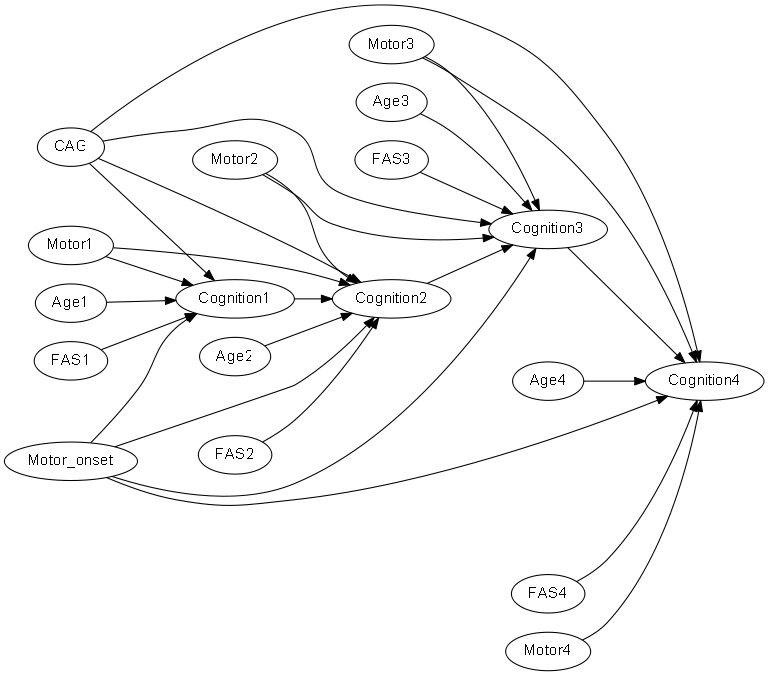Session Information
Date: Tuesday, June 6, 2017
Session Title: Huntington's Disease
Session Time: 1:45pm-3:15pm
Location: Exhibit Hall C
Objective: To develop a conceptual model to determine the rate of cognition impairment in Huntington’s disease manifest patients and to identify the factors that influence the progression rate.
Background: Huntington’s disease is an inherited autosomal dominant neurodegenerative disease caused by a gene mutation, which results in progressive deterioration of the motor and cognitive abilities. The nature and extend of cognitive impairment is not clearly identified because in-between of the prodromal phase and the late stage there is lack of information on how it progresses. There is evidence that cognition impairment can be affected by functional and motor conditions, CAG repeats, education level and sex.
Methods: A theory-driven longitudinal structural equation model was developed. Cognition was measured by six indicators: Symbol Digit Modality Test, Stroop Word Reading, Stroop Color Naming, Trail Making Test part A and B, Verbal Fluency Test and Strop Interference Test. Longitudinal data from Enroll-HD public dataset (December 2016) was used to validate the model. The full model was estimated in R with package semPLS. The measurement model was validated trough reliability and validity measures.
Results: 134 HD manifest participants were considered with 4 years of follow up, 58% male, mean age 53.5±11.6 yo; 58% have a ISCED level higher than 3. Mean CAG repeats was 43.4±3.6 and motor onset 47.1±10.8 yo. Motor score was 26.9±13.5, TFC score 9.5±2.9 and FAS score 21.1±4.4. The reliability of the model was higher than 0.90 and convergent validity above 0.5 for all the latent variables; the average R2 was 0.79. The rate of cognition decline is low in the first 2 years (1%), increasing to 9% between the third and fourth year. Indicators for attention and integration of information do not have impact on cognition after three years of evaluation. Except for sex, all other variables do not have a significant impact on cognition impairment. The rate of progression in women is higher than the global average between the third and fourth year (20%), and also when compared with men rate of progression.
Conclusions: The conceptual model for cognition impairment was validated and sex was identified as a relevant factor for cognition decline. The characteristics of the manifest population studied may influence the rate of progression and therefore the model should be validated using other HD datasets.
To cite this abstract in AMA style:
N. Gonçalves, J. Mendes, J. Ferreira, C. Sampaio. Huntington’s Disease: Determinants for Cognitive Disease Progression – A Proposed Model [abstract]. Mov Disord. 2017; 32 (suppl 2). https://www.mdsabstracts.org/abstract/huntingtons-disease-determinants-for-cognitive-disease-progression-a-proposed-model/. Accessed January 19, 2026.« Back to 2017 International Congress
MDS Abstracts - https://www.mdsabstracts.org/abstract/huntingtons-disease-determinants-for-cognitive-disease-progression-a-proposed-model/

